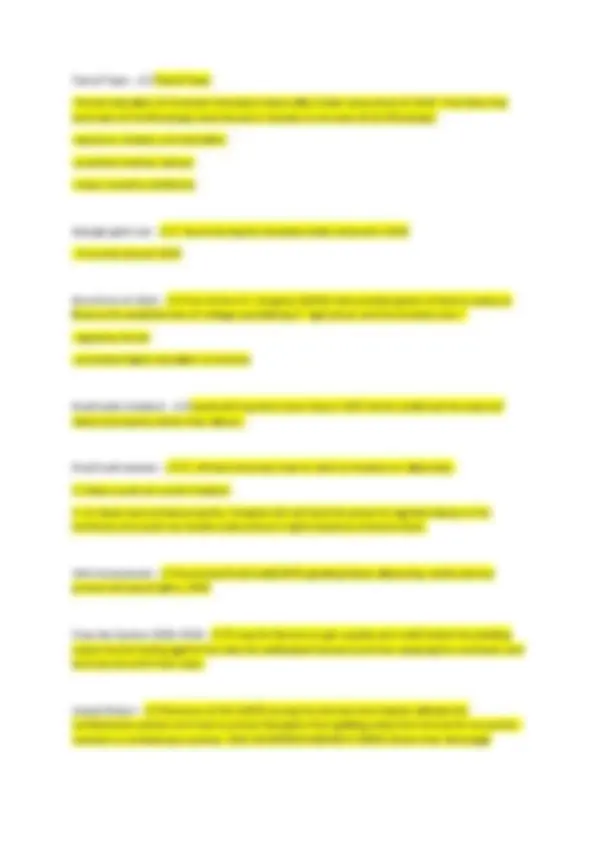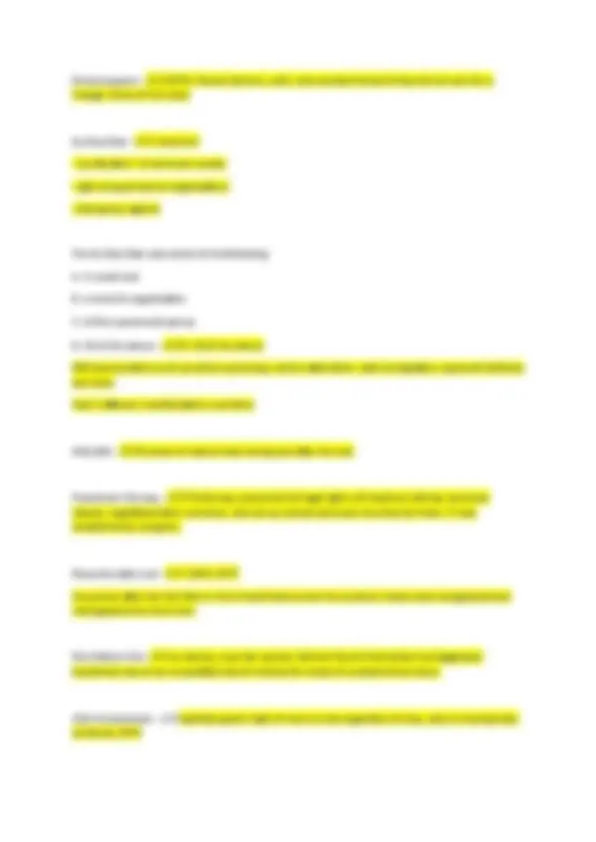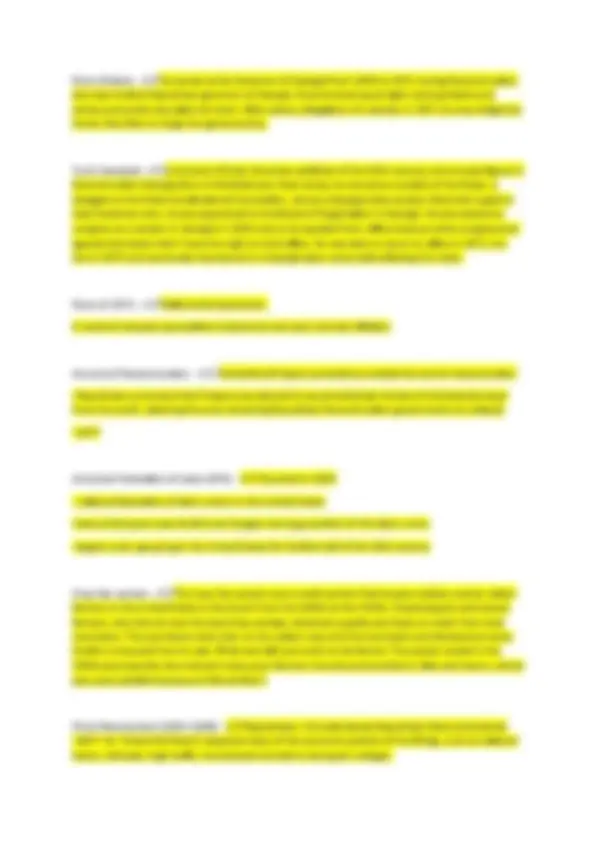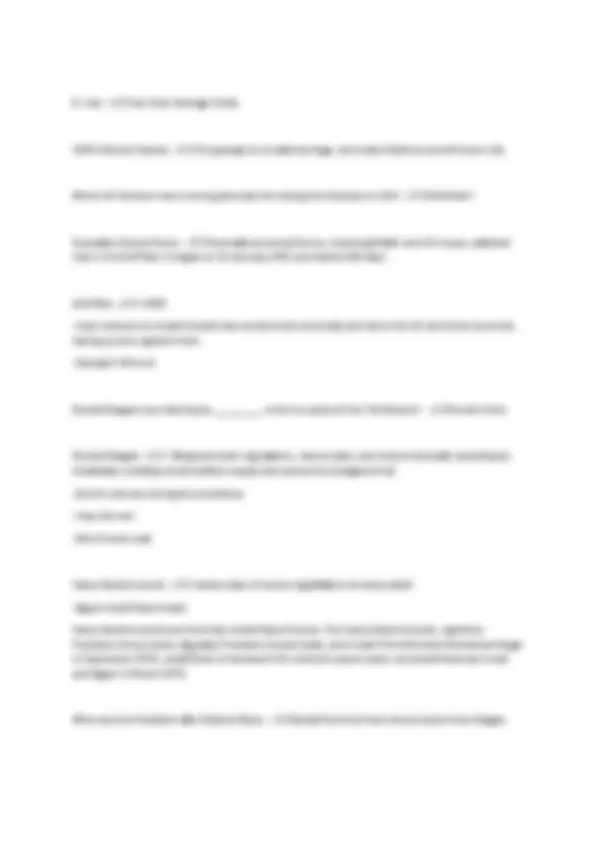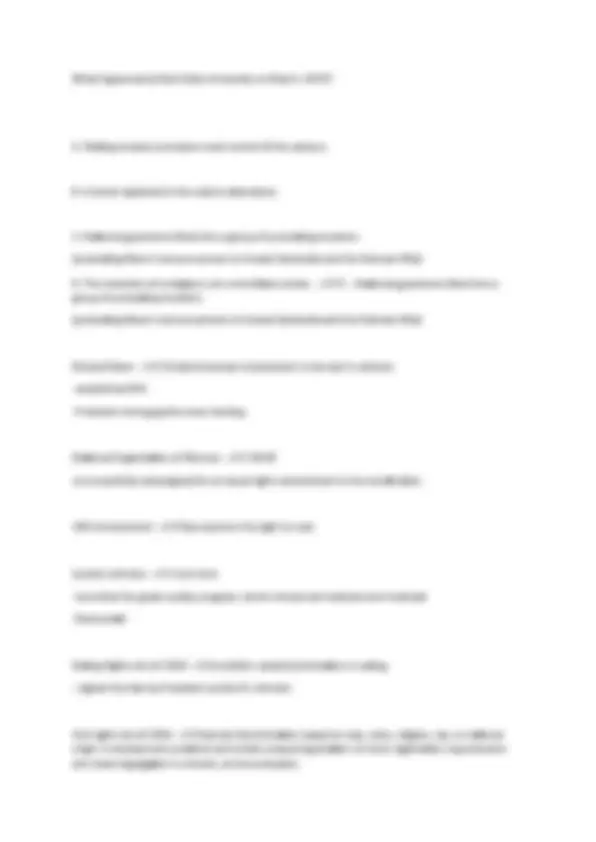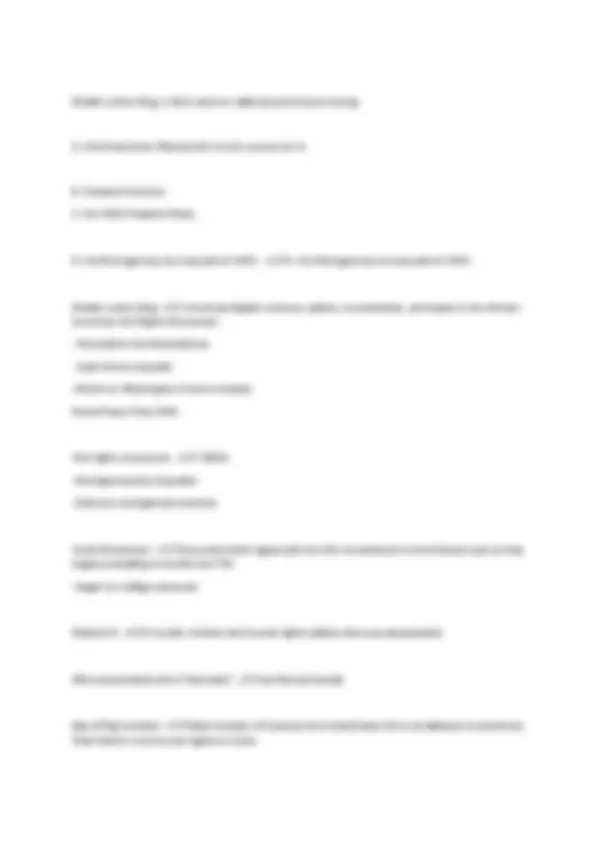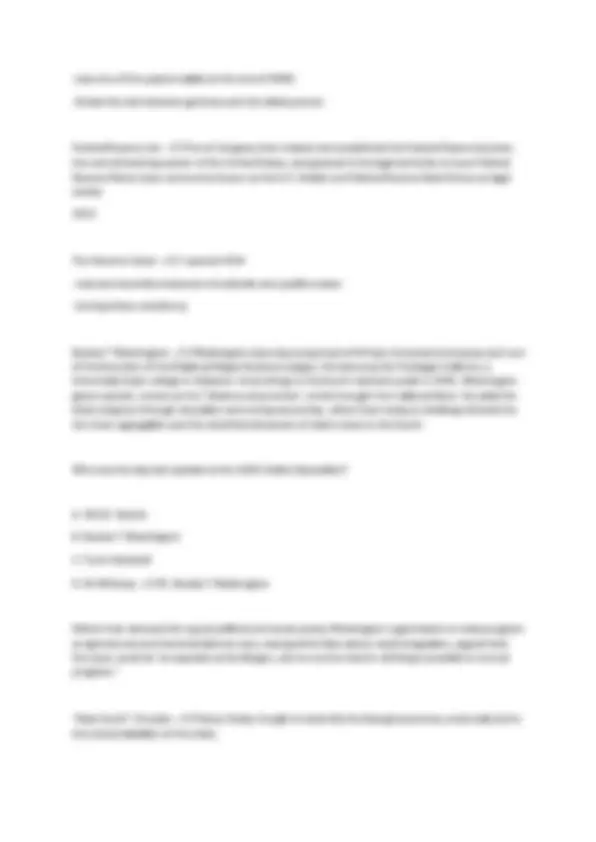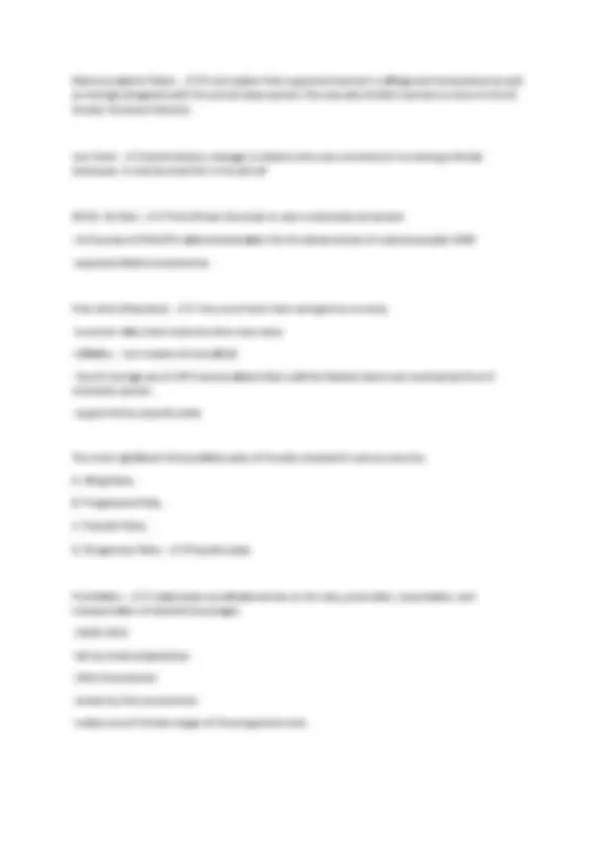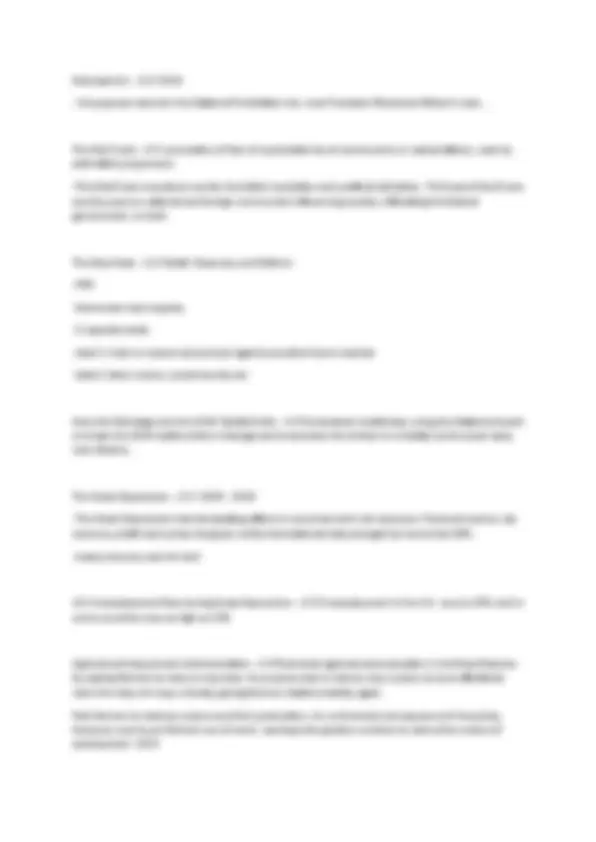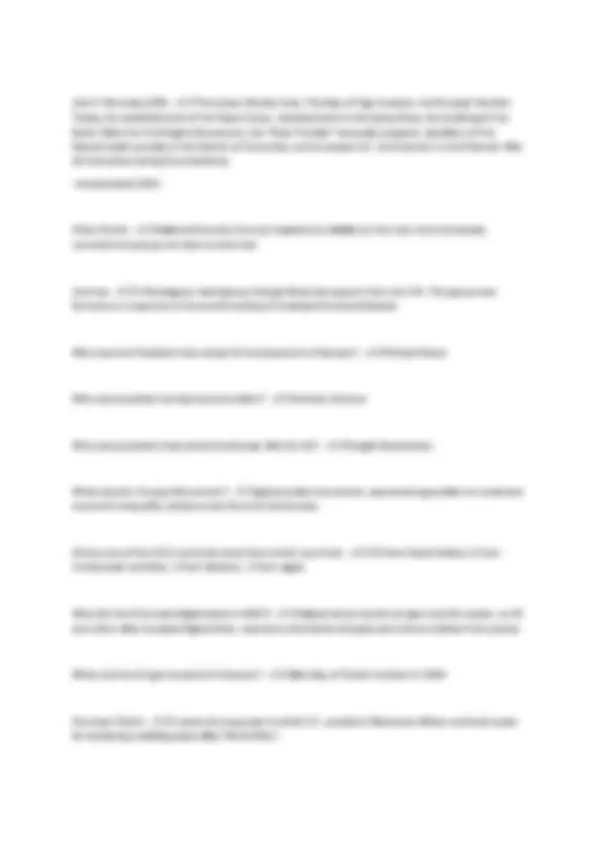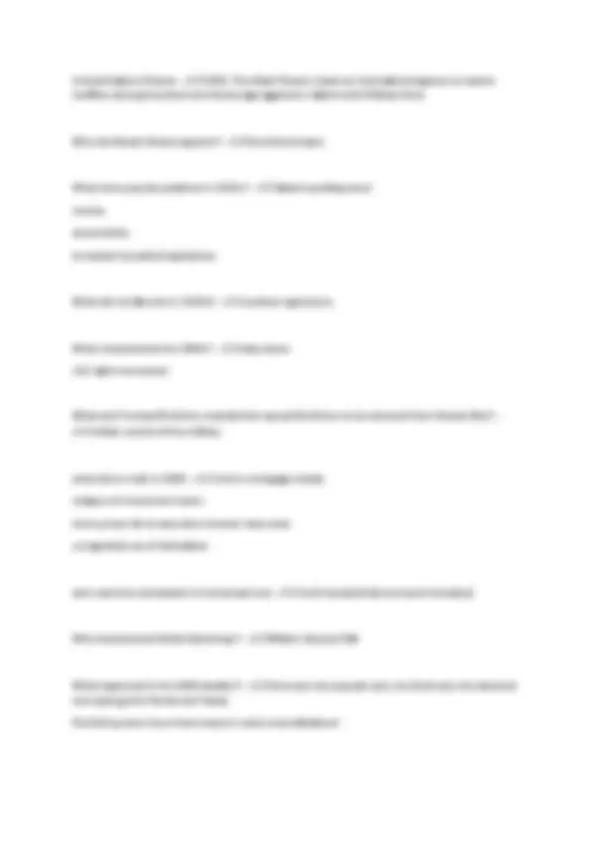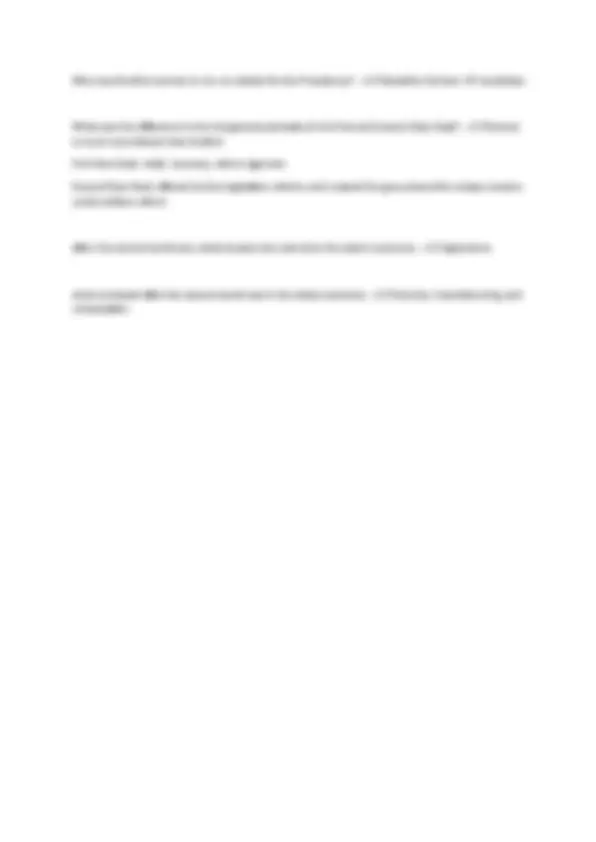Download UGA History Exemption Exam Part 3 Revised Questions and Answers / Sure A + and more Exams History in PDF only on Docsity!
UGA History Exemption Exam Part 3
Revised Questions and Answers / Sure
A +
Herman Talmadge - ✔✔GA governor; in reaction to Brown vs. BOE he declared that GA will 'not tolerate the mixing of races in public schools or any other tax supported institutions." Forcibly took over the Governor's mansion until it was officially announced he had lost the election Baker v Carr - ✔✔1962 set a precedent for federal court intervention in state legislative apportionment disputes and thus paved the way for the courts to invalidate the county-unit system. New Deal efforts - ✔✔-wanted to make the federal government more economically and socially responsible for its citizens
- Challenged racism and discrimination Iraqi Attack against Kuwait - ✔✔-Iraqis believed that kuwait was stealing their petroleum
- Kuwait fell and became the 19th province of Iraq
- 1990 Why did the US boycott the 1980 Olympics? - ✔✔to protest 1979 Soviet invasion of Afghanistan George H.W. Bush - ✔✔President who broke their "no new taxes" promise and arrested Panamanian president Fourth Party System (1896-1932) - ✔✔Progressives- Booker T Washington, WEB Dubois Marbury vs. Madison - ✔✔Supreme Court case which established the principle of judicial review 1803 Louisiana Purchase - ✔✔- 1803
- US bought land from france
- Thomas Jefferson president
- Federalists party opposed, argued that it was unconstitutional to acquire territory
- Lewis and Clarke set out to explore after purchase Milledgeville (1804-1868) - ✔✔Georgia's fourth capital and seat of the state government during the Civil War (1861 - 1865) War of 1812 - ✔✔The US fought this war against the British and their allies. The British were in a war with the French at the time, and in an effort to prohibit the French from getting resources from the US, the British formed blockades so the the US could not export to France. The Americans suffered many defeats at the hands of the British but still came out victorious. This was partially seen as the second revolutionary war and fostered a sense of national pride.
- President madison
- Burned DC Andrew Jackson - ✔✔Defeated the British and Native Americans in a battle in New Orleans that marked a turning point in the War of 1812. Hartford Convention - ✔✔- 1814 - 1815
- federalists expressed grievances with the war of 1812
- Federalists were upset w 3/5 compromise and required a 2/3 majority in congress for the admission of new states
- The convention discussed removing the three-fifths compromise which gave slave states more power in Congress and requiring a two-thirds super majority in Congress for the admission of new states, declarations of war, and laws restricting trade. The Federalist party dissolved soon after this convention with Jackson's victory in New Orleans. It kinda marked the end of the federalists Dartmouth College Case v. Woodward - ✔✔- 1819
- Dealt with the contract clause
- Court ruled in favor of the school to remain private when the state of New Hampshire wanted them to be public
- The case arose when the president of Dartmouth College was deposed by its trustees, leading to the New Hampshire legislature attempting to force the college to become a public institution Railroads West - ✔✔In 1837 engineers for the Western and Atlantic Railroad (a state-sponsored project) staked out a point on a ridge about seven miles east of the Chattahoochee River as the southern end of a rail line they planned to build south from Chattanooga, Tennessee.
Sharecroppers - ✔✔1870's Tenant farmers, serfs, who worked the land they did not own for a meager share of the crops Ku Klux Klan - ✔✔-terrorism
- "purification" of american society
- right wing extremist organizations
- hate group against The Ku Klux Klan was which of the following A. A social club B. a terrorist organization C. white supremacist group D. All of the above - ✔✔D. All of the above KKK took positions such as white supremacy, white nationalism, anti-immigration, opposed Catholics and Jews Had 3 different manifestations over time 460,000 - ✔✔Number of slaves freed during and after the war Freedman's Bureau - ✔✔The Bureau protected the legal rights of freedmen (african american slaves), negotiated labor contracts, and set up schools and even churches for them. IT was established by congress. Reconstruction era - ✔✔- 1865 - 1877 the period after the Civil War in the United States when the southern states were reorganized and reintegrated into the Union Post Bellum Era - ✔✔no slavery, crop-lien system, farmers found themselves mortgaging an implanted crop at an unspecified rate of interest for a loan of undetermined value. 15th Amendment - ✔✔explicitly grants right of men to vote regardless of race, color or having been enslaved; 1870
Rufus Bullock - ✔✔He served as the Governor of Georgia from 1868 to 1871 during Reconstruction and was the first Republican governor of Georgia. He promoted equal rights among blacks and whites and public education for both. After various allegations of scandal, in 1871 he was obliged by the Ku Klux Klan to resign the governorship. Tunis Campbell - ✔✔prominent African American politician of the 19th century, and a major figure in Reconstruction Georgia.Born in Middlebrook, New Jersey, he served as a Justice of the Peace, a delegate to the State Constitutional Convention, and as a Georgia state senator.Died with a goal to help freedmen vote, he was appointed to the Board of Registration in Georgia. He was elected to congress as a senator in Georgia in 1868 only to be expelled from office because white congressmen agreed that blacks didn't have the right to hold office. He was able to return to office in 1871, but lost in 1872 and eventually imprisoned in a Georgia labor camp before fleeing the state. Panic of 1873 - ✔✔Nationwide depression. A result of rampant speculative investments and post civil war inflation the end of Reconstruction - ✔✔-Rutherford B hayes's presidency marked the end of reconstruction
- Republicans promised that if Hayes was elected he would withdraw the last of the federal troops from the south, allowing the only remaining Republican Reconstruction governments to collapse
- 1877 American Federation of Labor (AFL) - ✔✔-founded in 1886
- national federation of labor unions in the United States
- Samuel Gompers was the first and longest serving president of this labor union
- largest union grouping in the United States for the first half of the 20th century Crop-lien system - ✔✔The crop-lien system was a credit system that became widely used by cotton farmers in the United States in the South from the 1860s to the 1930s. Sharecroppers and tenant farmers, who did not own the land they worked, obtained supplies and food on credit f rom local merchants. The merchants held a lien on the cotton crop and the merchants and landowners were the first ones paid from its sale. What was left over went to the farmer. The system ended in the 1940s as prosperity returned and many poor farmers moved permanently to cities and towns, where jobs were plentiful because of World War II Third Party System (1854-1890) - ✔✔Republicans- the anti-slavery Republican Party (nicknamed "GOP" for "Grand Old Party") adopted many of the economic policies of the Whigs, such as national banks, railroads, high tariffs, homesteads and aid to land grant colleges.
Bill Clinton 1993- 2001 - ✔✔- signed the North American Free Trade Agreement
- Failed National health care reform
- CHIP NAFTA - ✔✔- an agreement signed by Canada, Mexico, and the United States, creating a trilateral rules-based trade bloc in North America. 1993 signed by Bill Clinton California 1990's view on affirmative action - ✔✔Disallowed state public institutions from discriminating on the basis of race, sex or ethnicity. That means the UC system can't use an individual's race as a factor when considering an application. Henry Ross Perot - ✔✔-A US businessman best known for running for President of the US. He founded Electronic Data Systems and sold the company to General Motors and founded Perot Systems which was bought by Dell. Reagan Revolution - ✔✔-political realignment in the U.S. in favor of conservative domestic and foreign policies Jimmy Carter - ✔✔39th President who stressed human rights. Because of the Soviet war in Afghanistan, he enacted an embargo on grain shipments to USSR and boycotted the 1980 Olympics in Moscow; former Georgia governor WON NOBLE PEACE PRIZE 1977 - 1981 Which nation held fifty-eight hostages in their capital's American Embassy in 1979 and 1980? A. Iraq B. The Soviet Union C. Nicaragua
D. Iran - ✔✔Iran (Iran Hostage Crisis) 1996 Olympic Games - ✔✔Put georgia on a national stage, and made Atlanta a world known city. Which US Govenor was a strong advocate for having the Olympics in GA? - ✔✔Zell Miller? Operation Desert Storm - ✔✔international armed forces, including British and US troops, attacked Iraq in the Gulf War. It began on 16 January 1991 and lasted 100 days. Gulf War - ✔✔- 1990
- Iraq's decision to invade Kuwait was condemned universally and led to the US and other countries taking up arms against them.
- George H W bush Ronald Reagan was referring to _________ when he spoke of the "Evil Empire" - ✔✔Soviet Union Ronald Reagan - ✔✔- lift government regulations, reduce taxes, and reduce domestic spending by drastically curtailing social welfare-supply side economics (reaganomics)
- End of cold war during his presidency
- Iraq-iran war
- Fall of berlin wall Camp David Accords - ✔✔-twelve days of secret negotiations at camp david
- Egypt-Israel Peace treaty Camp David Accords and the Arab-Israeli Peace Process. The Camp David Accords, signed by President Jimmy Carter, Egyptian President Anwar Sadat, and Israeli Prime Minister Menachem Begin in September 1978, established a framework for a historic peace treaty concluded between Israel and Egypt in March 1979. Who was the President after Richard Nixon - ✔✔Gerald Ford and then Jimmy Carter then Reagan
Martin Luther King, Jr. first came to national prominence during: A. the Greensboro Woolworth's lunch counter sit-in. B. Freedom Summer. C. the 1961 Freedom Rides. D. the Montgomery bus boycott of 1955. - ✔✔D. the Montgomery bus boycott of 1955. Martin Luther King - ✔✔-American Baptist minister, activist, humanitarian, and leader in the African- American Civil Rights Movement.
- Nonviolent civil disobedience
- lead the bus boycott
- March on Washington (I have a dream) Nobel Peace Prize 1964 Civil rights movement - ✔✔-1960s
- Montgomery Bus boycotts
- Selma to montgomery marches Youth Movement - ✔✔The youths didn't agree with the US's involvement in the Vietnam war so they began protesting in the 60s and 70s
- began on college campuses Malcom X - ✔✔A muslim minister and human rights activist who was assassinated Who assassinated John F Kennedy? - ✔✔Lee Harvey Oswald Bay of Pigs Invasion - ✔✔Failed invasion of Cuba by the United States CIA in an attempt to overthrow Fidel Castro's communist regime in Cuba.
John Brown - ✔✔raid on Harper's Ferry was an effort by armed abolitionist John Brown to initiate an armed slave revolt in 1859 by taking over a United States arsenal at Harpers Ferry, Virginia. Populist Party - ✔✔Farm-based movement of the late 1890s grew into a joint effort between farmers and labor groups against big business and machine-based politics. The movement became a third party in the election of 1892. Led by Tom Watson Jim Crow laws - ✔✔unwritten and written laws to follow included the poll tax, literacy test, and property requirements, separate but equal laws
- enacted after reconstruction period
- racial segregation Plessy vs. Fergeson (1896) - ✔✔separate but equal Voting Restrictions - ✔✔poll taxes, literacy test, grandfather clause (old rule applies to current generations but new rule applies to future generations), property requirements aimed at disenfranchising black voters Sherman Antitrust Act - ✔✔-United States antitrust law (or "competition law") passed by Congress in
- Passed under the presidency of Benjamin Harrison, it prohibits certain business activities that Federal government deems to be anti-competitive.
- monopolies and cartels Spanish American War - ✔✔This war in 1898 resulted in the US acquiring territories in the western Pacific and Latin America. Spain was trying to retain Cuba, despite their riots for independence, and when the US sent the USS Maine to Cuba to protect the US interests in Cuba, the ship was sunk, further upsetting the US. Spain declared war on the US and got annihilated. Theodore Roosevelt and his "rough riders' played a role in this war. Immigration in the early 1900s - ✔✔-By 1910, Eastern and Southern Europeans made up 70 percent of the immigrants entering the country.
- dropped in 1914 after the war
- Ellis Island was the gateway to immigrants and is where the statue of liberty is mounted.
- was one of the peace treaties at the end of WW
- Ended the war between germany and the allied powers Federal Reserve Act - ✔✔Act of Congress that created and established the Federal Reserve System, the central banking system of the United States, and granted it the legal authority to issue Federal Reserve Notes (now commonly known as the U.S. Dollar) and Federal Reserve Bank Notes as legal tender. 1913 The Panama Canal - ✔✔-opened 1914
- reduced travel time between the atlantic and pacific oceans
- during wilson presidency Booker T Washington - ✔✔Washington was a key proponent of African-American businesses and one of the founders of the National Negro Business League. His base was the Tuskegee Institute, a historically black college in Alabama. As lynchings in the South reached a peak in 1895, Washington gave a speech, known as the "Atlanta compromise", which brought him national fame. He called for black progress through education and entrepreneurship, rather than trying to challenge directly the Jim Crow segregation and the disenfranchisement of black voters in the South. Who was the keynote speaker at the 1895 Cotton Exposition? A. W.E.B. Dubois B. Booker T Washington C. Tunis Campbell D. Eli Whitney - ✔✔B. Booker T Washington Rather than advocate for equal political and social power, Washington urged blacks to make progress as agricultural and industrial laborers and, easing white fears about racial integration, argued that the races could be "as separate as the fingers, yet one as the hand in all things essential to mutual progress." "New South" Crusade - ✔✔Henry Grady- Sought to diversify the Georgia economy; eventually led to the industrialization of the state.
Rebecca Latimer Felton - ✔✔A civic leader that supported women's suffrage and temperance as well as strongly disagreed with the convict lease system. She was also the first woman to serve in the US Senate. Foremost feminist. Leo Frank - ✔✔Jewish factory manager in Atlanta who was convicted of murdering a female employee. A mob lynched him in his jail cell W.E.B. Du Bois - ✔✔-First African American to earn a doctorate at harvard
- Co founder of NAACP( national association for the advancement of colored people) 1909
- opposed Atlanta compromise Free silver (Populism) - ✔✔-the use of both silver and gold as currency
- incorrect ratios that made the silver lose value
- inflation... but maybe not beneficial
- fourth coinage act of 1873 demonetized silver until the federal reserve act overhauled the U.S monetary system.
- supported by populist party The most significant third political party of the late nineteenth century was the: A. Whig Party. B. Progressive Party. C. Populist Party. D. Mugwump Party. - ✔✔Populist party Prohibition - ✔✔-nationwide constitutional ban on the sale, production, importation, and transportation of alcoholic beverages
- 1920 - 1933
- led by social progressives
- 18th Amendment
- ended by 21st amendment
- makes one of the last stages of the progressive eras
World War 2 - ✔✔ 1939 - 1945 Allies - US, GB, France, Soviet Union Axis - Germany Japan Italy Germany Invaded Poland Japan Bombed Pearl Harbor Ended with Hiroshima Franklin D. Roosevelt - ✔✔President of the US during Great Depression and World War II. Implemented New Deal. Only president served 3 terms! Domino Theory - ✔✔A theory that if one nation comes under Communist control, then neighboring nations will also come under Communist control. 1950-1980s Pearl Harbor - ✔✔- 1941
- strike against US by Imperial japanese navy
- Led the US into WW
- declared a war crime
- voided roosevelt's neutrality act Victory Gardens - ✔✔Victory gardens, also called war gardens or food gardens for defense, were vegetable, fruit, and herb gardens planted at private residences and public parks in the United States, United Kingdom, Canada, Australia and Germany during World War I and World War II.
- Used to reduce pressure on public food supply Calvin Coolidge - ✔✔-Vice President of Harding then finished his term when he died and was reelected as President in 1924 o Roaring 20s Herbert Hoover was his Sec. of State o Tax cuts, farm subsidies Scopes Trial - ✔✔- 1925
- Sub teacher was accused of violating tennessee's Butler Act (Unlawful to teach human evolution) Cold War - ✔✔political and military tension b/w Western Bloc (the United States, its NATO allies and others) and powers in the Eastern Bloc (the Soviet Union and its allies in the Warsaw Pact).
- 1947 - 91
- No large scale fighting b/w sides
- proxy wars
- policy of containment- stop spread of communism Georgia Flag - ✔✔1956 confederate flag was incorporated into the Ga State flag NATO - ✔✔North Atlantic Treaty Organization
- Mutual defense between the states in the treaty (Belgium, Canada, Denmark, France, Iceland, Italy, Luxembourg, the Netherlands, Norway, Portugal, the United Kingdom and the United States) Cuban Missile Crisis - ✔✔-aka October crisis
- 1962
- confrontation between the United States and the Soviet Union over Soviet ballistic missiles deployed in Cuba.
- Khrushchev and Fidel Castro
- Kennedy and Khrushchev came to an agreement and the soviets dismantled.
- Moscow-Washington hotline was formed Vietnam War - ✔✔-b/w North vietnam (Supported by soviets and china) ans South vietnam (Supported by US and other anti-communist allies)
- 1955 - 75
- U.S ended its involvement in the war in 1973 Tet Offensive - ✔✔o Military campaign during the Vietnam War in 1968 o Series of surprise attacks by the Vietcong and N Vietnamese on US troops. US won but still caused physical and psychological destruction o Vietnam war was mainly guerilla tactics
United Nations Charter - ✔✔1945, The Allied Powers create an international agency to resolve conflicts among members and discourage aggressor nations with Military force Who did Barack Obama appoint? - ✔✔Sonia Sotomayor What were popular pastimes in 1920s? - ✔✔attend sporting event movies automobiles increased household appliances What did not flourish in 1920s? - ✔✔southern agriculture What characterized the 1950s? - ✔✔baby boom civil rights movement What was Truman/McArthur scandal that caused McArthur to be removed from Korean War? - ✔✔civilian control of the military what led to crash in 2008 - ✔✔crisis in mortgage market collapse of investment banks home prices fell at same time interest rates reset unregulated use of derivatives who were the combatants in the korean war - ✔✔north korea(china) and south korea(us) Who implemented Dollar Diplomacy? - ✔✔William Howard Taft What happened in the 2000 election? - ✔✔Gore won the popular vote, but Bush won the electoral vote (along with Florida and Texas). Florida Supreme Court hand recount ruled unconstitutional
Who was the first woman to run on a ticket for the Presidency? - ✔✔Geraldine Ferraro- VP candidate What was the difference in the Congressional ideals of the First and Second New Deal? - ✔✔Second is much more liberal than the first First New Deal- relief, recovery, reform agencies Second New Deal- offered further legislative reforms and created the groundwork for todays modern social welfare reform after the second world war, what became less central to the state's economy - ✔✔agriculture what increased after the second world war in the states economy - ✔✔industry, manufacturing, and urbanization

